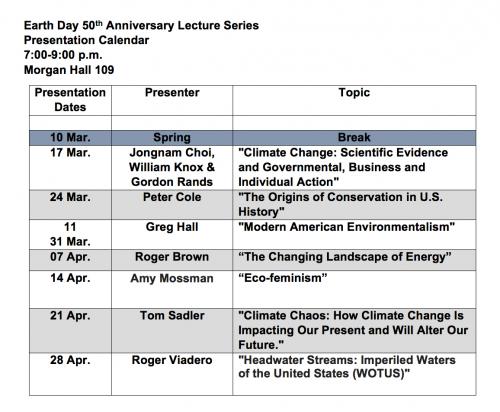University News
Postponed: WIU to Commemorate 50th Anniversary of Earth Day with Lecture Series
March 16, 2020
This Earth Day Lecture Series has been postponed until the Fall 2020 semester.
MACOMB, IL – In celebration of the 50th anniversary of Earth Day, the Western Illinois University Sustainability Committee will sponsor an Earth Day Lecture Series, which kicks off Tuesday, March 17 and will include seven presentations on environmental issues.
The presentations will be given by current and former members of the Western Illinois University faculty, and each one will be held from 7-9 p.m. in Morgan Hall, room 109. Each event is open free to the public.
This year's schedule includes:
• March 17 – " Climate Change: Scientific Evidence and Governmental, Business and Individual Action" – by Earth, Atmospheric and Geographic Info Sciences Professor Jongnam Choi; English Professor William Knox and Management and Marketing Professor Gordon Rands. This panel will begin with an overview of the scientific data on the causes and effects of climate change, will then address the policy options that governments and businesses have that could reduce the risk of runaway climate change and review what actions are -- and are not -- being taken so far, and will then consider the ways that individuals can take action, as well as the limits on individual action created by the choices of governments and businesses. Discussion of these issues with those attending will follow.
• March 24 – "The Origins of Conservation in U.S. History" - by History Professor Peter Cole. In the late 19th and early 20th centuries, due to increasingly obvious impacts of industrialization on the environment, a major shift in attitude, toward conserving natural resources and the land, emerged. Only through robust governmental involvement could clearcutting, soil erosion and massive air and water pollution be addressed while also reserving precious finite resources for future generations. The U.S. government also started establishing national parks, forests and wildlife refuges. These efforts--to manage natural resources in a scientific manner and with governmental oversight--as well as the birth of a social movement to advocate for the environment, all are legacies of that era's conservationists.
• March 31 – "Modern American Environmentalism" – by History Professor Greg Hall. This lecture will focus on the environmental movement in the United States from the post-WWII period to the present. The lecture examines ecology, federal environmental public policy, several major environmental disasters, deep ecology and international environmental issues that require international solutions.
• April 7 – "The Changing Landscape of Energy" – by Roger Brown, a former Illinois Institute for Rural Affairs and Management department faculty member who now works as a consultant on energy development projects. This lecture will address the evolution and impact of our energy sources and discussing the current and future state of energy, including progress, challenges, technology and locations.
• April 14 – "Eco-feminism" – by English Professor Amy Mossman. The event will include a viewing of the documentary "Living Downstream," which follows ecologist and writer Sandra Steingraber's scientific investigation of links between environmental contamination and human health, as well as her personal cancer journey. After the film, attendees will discuss the ways in which Steingraber's work embodies and challenges ecofeminism as she explores layers of interconnections between humans, other beings, and the world we share.
• April 21 – "Climate Chaos: How Climate Change is Impacting Our Present and Will Alter our Future" – by Economics and Decision Sciences Professor Tom Sadler. Throughout this century, global warming will lead to climate chaos, including more wildfires, volatile storms, freshwater flooding and extinction. Our economic and energy behavior in the next decade will determine the level of intensity of these outcomes.
• April 28 – "Headwater Streams: Imperiled Waters of the United States" – by Institute for Environmental Studies Director Roger Viadero. Recent regulatory changes are affecting the regulation of the Waters of the United States (WOTUS). Come learn about the implications these changes have for ephemeral streams and wetlands in the Upper Mississippi River basin.
The first Earth Day celebration was held April 22, 1970, and it is estimated that 20 million Americans participated in events that day, mainly on college and university campuses. The anniversary allows for the opportunity to explore the history of the environmental movement and how environmental issues can be addressed in the coming years.
For more information on sustainability at WIU, visit wiu.edu/sustainability.
Posted By: University Communications (U-Communications@wiu.edu)
Office of University Communications & Marketing


Connect with us: